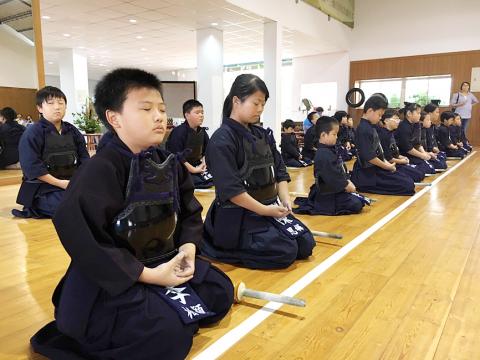The Taiwan Fund for Children and Families’ (TFCF) Changhua branch on Thursday held a ceremony to thank a farmer who donated a truckload of cabbages to help the group purchase protective armor for its kenjutsu team.
Lin Chin-te (林進得) donated a truckload of about 1,000 cabbages early this year after cabbage prices plummeted, it said.
About the same time, the group formed a kenjutsu — Japanese swordsmanship — team for students it was looking after.

Photo: Yen Hung-chun, Taipei Times
Branch supervisor Lin Hui-mei (林惠媚) said it did not have the money to purchase the armor, which costs NT$13,000 apiece, so she had an idea to sell the cabbages to raise funds.
She launched an online fundraiser titled “Raising funds for kenjutsu outfits for TFCF kids,” which sold the cabbages at NT$10 each.
Much to her surprise, all the cabbages were sold in just three days, she said.
The fundraiser attracted the attention of a local columbarium, Damao Biotech, a local bakery, Taipei-based Lei Ying Co and nurses at the Yuanlin Christian Hospital, who donated more items to the group.
TFCF made NT$444,000 from selling the donations, surpassing its goal of NT$400,000, Lin said.
Recounting how the team was founded, Lin said many of the children had behavioral issues and nothing she tried could control them.
She then thought of working with kenjutsu practitioner Chan Chih-yuan (詹智淵) to instruct the children in the martial art.
With Chan’s help, the group established contact with former national kenjutsu team coach Chuang Yi-yuan (莊益源), who agreed to coach them.
Kenjutsu made a significant change in the children, Lin said.
“For example, they used to ignore me when I asked them to mop the floors, but now they take the initiative to clean,” she said.
She said she is proud to see the children focused and competitive while practicing kenjutsu and show good manners outside of class.
“Acts of kindness will be rewarded by more kindness,” Lin said, thanking people for their support.

Taiwan is stepping up plans to create self-sufficient supply chains for combat drones and increase foreign orders from the US to counter China’s numerical superiority, a defense official said on Saturday. Commenting on condition of anonymity, the official said the nation’s armed forces are in agreement with US Admiral Samuel Paparo’s assessment that Taiwan’s military must be prepared to turn the nation’s waters into a “hellscape” for the Chinese People’s Liberation Army (PLA). Paparo, the commander of the US Indo-Pacific Command, reiterated the concept during a Congressional hearing in Washington on Wednesday. He first coined the term in a security conference last

Prosecutors today declined to say who was questioned regarding alleged forgery on petitions to recall Democratic Progressive Party (DPP) legislators, after Chinese-language media earlier reported that members of the Chinese Nationalist Party (KMT) Youth League were brought in for questioning. The Ministry of Justice Investigation Bureau confirmed that two people had been questioned, but did not disclose any further information about the ongoing investigation. KMT Youth League members Lee Hsiao-liang (李孝亮) and Liu Szu-yin (劉思吟) — who are leading the effort to recall DPP caucus chief executive Rosalia Wu (吳思瑤) and Legislator Wu Pei-yi (吳沛憶) — both posted on Facebook saying: “I

The Ministry of Economic Affairs has fined Taobao NT$1.2 million (US$36,912) for advertisements that exceed its approved business scope, requiring the Chinese e-commerce platform to make corrections in the first half of this year or its license may be revoked. Lawmakers have called for stricter enforcement of Chinese e-commerce platforms and measures to prevent China from laundering its goods through Taiwan in response to US President Donald Trump’s heavy tariffs on China. The Legislative Yuan’s Finance Committee met today to discuss policies to prevent China from dumping goods in Taiwan, inviting government agencies to report. Democratic Progressive Party Legislator Kuo Kuo-wen (郭國文) said

The Ministry of Economic Affairs has fined Taobao NT$1.2 million (US$36,900) for advertisements that exceeded its approved business scope and ordered the Chinese e-commerce platform to make corrections in the first half of this year or its license would be revoked. Lawmakers have called for stricter supervision of Chinese e-commerce platforms and more stringent measures to prevent China from laundering its goods through Taiwan as US President Donald Trump’s administration cracks down on origin laundering. The legislature’s Finance Committee yesterday met to discuss policies to prevent China from dumping goods in Taiwan, inviting government agencies to report on the matter. Democratic Progressive Party